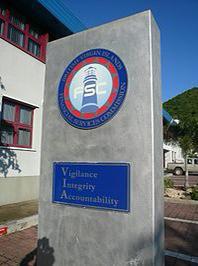354 James Walter Francis Drive
RJT Edifice Building, 5th Floor
Road Town, TORTOLA VG1110
Tel: 284 468 2730
Fax: 284 468 2750
Email: gis@gov.vg
 The Virgin Islands is taking all requisite steps to ensure that it adheres to its international obligations as an Overseas Territory of the United Kingdom.
The Virgin Islands is taking all requisite steps to ensure that it adheres to its international obligations as an Overseas Territory of the United Kingdom.
The Territory is also complying with all sanctions issued by the United Kingdom that are extended to it by way of the relevant Overseas Territories Sanctions Orders in Council.
Additionally, the BVI actively monitors the UK Sanctions listings published by the Foreign, Commonwealth and Development Office (FCDO), as well as the UK’s Office of Financial Sanctions Implementation (OFSI), with the Financial Services Commission (FSC) and the Financial Investigation Agency (FIA) ensuring the timely dissemination of sanctions updates to its financial services providers, designated non-financial businesses and professions and non-profit organisations.
Where any requests for international cooperation are received, the BVI stands ready to execute these, including the sharing of beneficial ownership information, with overseas law enforcement, under the Exchange of Notes with the United Kingdom Government under which information can be exchanged in as little as 1 hour in urgent cases.
Since the Russian invasion of Ukraine in February 2022, the Governor’s Office, as the Competent Authority for sanctions in the BVI, has received confirmation that assets with an estimated value of more than US$ 400,000,000 have been frozen to date. These actions have been taken in compliance with freezing obligations under The Russia (Sanctions) (Overseas Territories) Order 2020.
Governor John Rankin CMG, whose office is the Competent Authority for sanctions in the BVI has said “I welcome early steps taken by the British Virgin Islands, to ensure it meets the sanctions requirements in response to Russia's unprovoked, premeditated and unjustified invasion of Ukraine. The Governor’s Office, along with FCDO and OFSI, continues to support and work together with the FSC, FIA, and other relevant agencies and Competent Authorities in implementing these wide-ranging sanctions measures and meeting international obligations.”
Managing Director of the FSC Mr. Kenneth Baker noted that this cohesive approach to sanctions implementation is underpinned by the Territory’s Council of Competent Authorities which practices a joined-up delivery on international cooperation issues as a whole and promotes a strong culture of domestic cooperation amongst all Competent Authorities.
Financial sanctions are restrictions put in place to achieve a specific foreign policy or national security objective. They can limit the provision of certain financial services and restrict access to financial markets, funds and economic resources.
Notes: In general, financial sanctions are imposed to:
•Coerce a regime, or individuals within a regime, into changing their behaviour (or aspects of it) by increasing the cost on them to such an extent that they decide to cease the offending behaviour;
•Constrain a target by denying them access to key resources needed to continue their offending behaviour, including the financing of terrorism or nuclear proliferation;
•Signal disapproval, stigmatising and potentially isolating a regime or individual, or as a way of sending broader political messages nationally or internationally; and/or
•Protect the value of assets that have been misappropriated from a country until these assets can be repatriated.